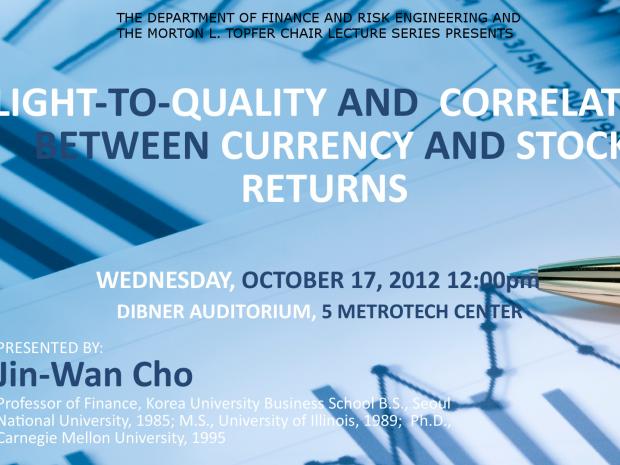Flight-to-Quality and Correlation between Currency and Stock Returns

Bio
Jin-Wan Cho, Professor of Finance, Korea University Business School B.S., Seoul National University, 1985; M.S., University of Illinois, 1989; Ph.D., Carnegie Mellon University, 1995 e-mail: npvcho@korea.ac.kr
Research Interests: International Finance, Market Microstructure, Derivative Market
Selected Publications/Papers
Earnings Announcement, Private Information, and Strategic Informed Trading,” Journal of Financial Intermediation, 2007.
The Generality of Spurious Predictability,” with J. Shin, and R. Singh, Financial Research Letters, 2004.
“Prices as Aggregators of Noisy Private Information: Evidence From the S&P 500 Futures,” with M. Krishnan, Journal of Financial and Quantitative Analysis, 2000.
“Endogenous Informed Trading in the Presence of Trading Costs: Effect on Observed Security Prices,” with J. Shin, and R. Singh, Journal of Financial Markets, 1999.
“Flight-to-Quality and Correlation between Currency and Stock Returns.” With J. Choi, T. Kim and W. Kim.
Abstract
In pair-wise analyses of a sample of 9 developed and 12 emerging markets, we find evidence that emerging country currencies are positively correlated with their stocks. Since return correlation between currency and its stocks has been shown to be weak or negative, this finding is somewhat surprising. We find that the numeraire currency used to measure currency returns is important in characterizing the return correlations. These strong ties between the currency and stock returns in emerging markets seem to be generated by international capital flows based on ‘flight-to-quality’ in down-markets. Since global equity markets are positively correlated, this implies that currencies provide a natural hedge for emerging country’s investors investing in developed countries. In other words, the currency market works an agent that shifts risks from the investors in emerging markets to those in the developed. If the goal of currency hedging is to reduce total return volatility from an international investment, investors from emerging markets should not hedge the currency risks when they invest in developed markets, while the converse is true for developed market investors investing in emerging markets. Using a unique sample of 27 ‘Siamese Twin’ international mutual fund pairs in Korea, which hold identical underlying foreign assets but offer different currency hedging alternatives, we find evidence that hedging currency risks actually undoes the natural hedge and increase the total return volatility.

